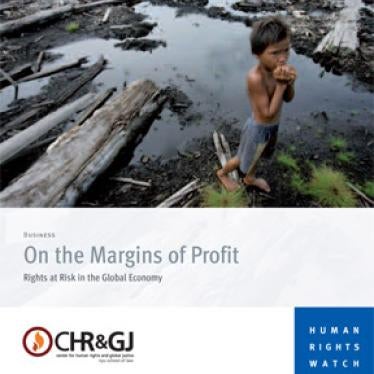People in countries across the world are regularly harmed when businesses fail to respect basic human rights, according to a new report by Human Rights Watch and the Center for Human Rights and Global Justice (CHRGJ) at New York University School of Law.
The clear evidence of widespread abuse and government inaction detailed in the report shows that global standards are needed to ensure that corporate conduct respects internationally recognized human rights.
“Many companies mistakenly assume that human rights aren’t their problem and don’t think they will ever be implicated in serious abuses,” said Lisa Misol, senior researcher on business and human rights at Human Rights Watch and the report’s primary author. “But the risks are greater than they think. Ensuring respect for fundamental rights is everyone’s business.”
The 53-page report, “On the Margins of Profit: Rights at Risk in the Global Economy,” was jointly prepared by Human Rights Watch and the Center for Human Rights and Global Justice. It illustrates how everyday business decisions have significant implications for the human rights of workers, local communities, suppliers, and consumers.
Drawing on more than a decade of research and reporting by Human Rights Watch, the report presents dozens of examples that detail the ways in which a wide variety of industries have an impact upon the whole spectrum of human rights around the globe.
Among its main findings, the report finds that:
- Any type of business can be implicated in human rights abuses, not only those that have received the most attention like companies in the apparel-manufacturing and extractive industries. Bars, pubs and clubs in several southern African countries, for example, have openly discriminated on the basis of sexual orientation, while employers in the Dominican Republic’s tourism industry have routinely subjected women workers to involuntary HIV testing, in violation of their rights to bodily integrity, nondiscrimination, and privacy.
- Companies can have a harmful impact on many different kinds of rights beyond labor rights. Pulp and paper companies in Indonesia that cut down vast forests affected the ability of local communities to seek a livelihood and adequate standard of living, as well as the cultural and land rights of indigenous communities in the region. When community members attempted to directly challenge company practices, they often faced brutal company-sponsored militias that used intimidation tactics, beat several people, destroyed and stole property, and detained villagers in an effort to silence them. These abuses impeded, among other rights, the villagers’ rights to property, to be free from arbitrary detention, and to exercise their freedoms of expression, association, and peaceful assembly.
- Companies can be implicated in abuses indirectly through their ties to third parties who carry out the abuse. A Swiss gold refiner for years purchased gold that originated in a conflict zone in the Democratic Republic of Congo (DRC) where a murderous armed group committed atrocities on a systematic basis. The proceeds from this trade provided local warlords in DRC with the ability to perpetuate their reign of terror on local villagers.
- Governments share responsibility for corporate misconduct since they frequently neglect to adopt and enforce appropriate laws to protect people from abuses by companies. Wal-Mart, the largest private employer in the United States, has relentlessly thwarted the right of its US workers to form and join trade unions at its 4,000 US stores. US labor laws are so weak that Wal-Mart and other companies can violate their employees’ basic rights in the US with virtual impunity.
- Victims of abuses involving businesses are often unable to obtain meaningful redress and frequently face retaliation when they stand up to powerful companies. When the now-defunct Enron Corporation decided to build a massive power plant in India, the company was unresponsive to villagers’ concerns that the project encroached on their land and diverted scarce water resources. As criticism of the project grew amidst allegations of corruption, the company and local authorities retaliated against the project’s critics by violently suppressing their peaceful protests.
This report builds a factual foundation to support calls for the creation of a widely applicable, overarching set of standards for all businesses, regardless of where and how they operate.
There is no common, widely agreed benchmark for business conduct that provides clear rules to prevent business-related human rights abuses and provide adequate remedies and reparation when they occur. Instead, existing corporate social responsibility initiatives offer a patchwork of many different standards that address select human rights, select companies or industries, or select countries or situations.
“The human cost of making a profit can be profound,” said Professor Smita Narula, faculty director of the Center for Human Rights and Global Justice. “Governments must ensure meaningful redress for victims and should develop global rules to make sure companies respect human rights, no matter where they operate.”
Human Rights Watch and the CHRGJ called on governments to work together to develop clear standards governing business conduct and to ensure national authorities adequately regulate companies and hold responsible those who commit abuses. This should result in a UN declaration or other international instrument agreed by governments that would define global standards for business conduct as well as clarify the role of governments and provide access to justice for those affected by misconduct.
Companies should take proactive steps to avoid committing abuses. Investors, financiers and consumers should insist that the companies they support adopt strong human rights policies and practices and put in place monitoring to ensure compliance, said Human Rights Watch and the CHRGJ.







